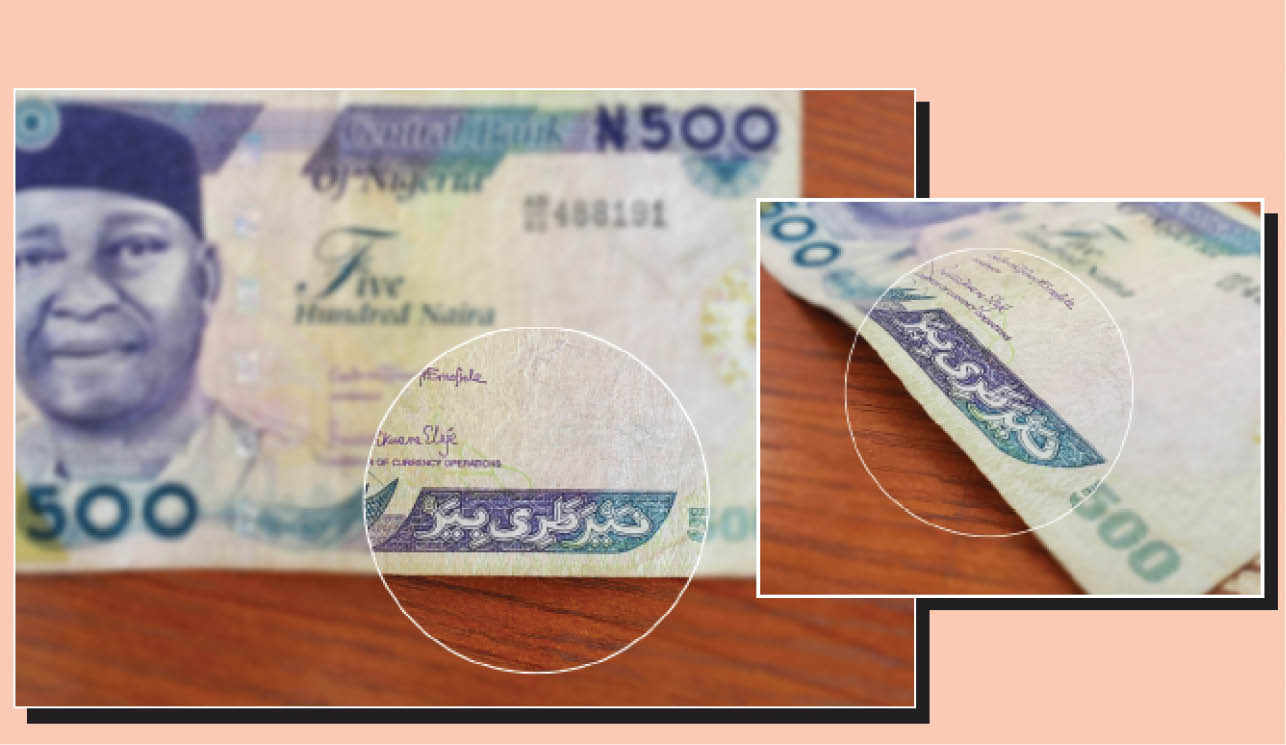The use of ‘Arabic’ script on naira notes, Nigeria’s currency, is once again a subject of controversy. A Lagos-based lawyer, Malcolm Omirhobo, has filed a suit seeking the court to compel the federal government to remove the Arabic script, which according to the lawyer “portrays Nigeria as an Islamic state”. Omirhobo argued that “Nigeria is a secular nation” and therefore prayed the court to declare it illegal, unlawful, and unconstitutional for Arabic language to be inscribed on naira notes rather than English language or Hausa, Yoruba and Igbo. The same lawyer had also filed a similar suit against the Nigerian Army seeking the removal of Arabic inscriptions from its logo. The cases are being heard by Justice Mohammed Liman at the Lagos High Court.
Aside of the huge “colossal sum of money” that would be required to discard the existing notes and print new ones without the controversial script, the Central Bank of Nigeria (CBN), which is challenging the suit, has told the Federal High Court sitting in Lagos that the ‘contentious’ script is not a symbol or mark of Islam but an inscription to aid non-English speakers who are literate in and use of other alphabets (in this case the Ajami script) in their transactions. It made the submission in a counter-affidavit to Malcolm Omirhobo’s suit before Justice Mohammed Liman.
It is unfortunate that nearly all the arguments advanced by Omirhobo as basis for his lawsuit only reveal how ill-informed he is, more so as a ‘learned’ member of the bar, about some basic facts of history and even geography. Based on the provisions of Section 38 of the 1999 constitution which grants citizens the “right to freedom of thought, conscience and religion”, Nigeria is rather a multi-religious nation, not a secular state. Secular, which is a noun that derives from secularism refers to the system that rejects all forms of religious faith and worship.
Similarly, the inscription in Arabic script on the naira notes is actually not Arabic. A native speaker of Arabic would read it without knowing what it means. The same scenario plays out when a native English speaker reads a non-English phrase written in Latin letters (a, b, c, d, e, which many people ordinarily call English letters). For instance, a “John Bull” would read the Hausa phrase “Dan Iska” written in Latin script without knowing its meaning. The use of Arabic script to transcribe other languages is technically called “Ajami”. In the same way that Latin script is used to write Hausa, Igbo, Yoruba, Nupe, Kanuri, Igala and Ebira; the Arabic script is also deployed where necessary to write these same languages or others including English.
For most parts of the 19th century, Ajami was a dominant system of writing and communication in northern parts of Nigeria before British colonialists arrived with the Latin alphabet. Some of the poems composed by Nana Aisha, the learned daughter of Shehu Usmanu Danfodio, were in Ajami Fulfulde. Within the context of the United Nations Educational Scientific and Cultural Organization (UNESCO)’s definition of literacy, anyone who could read or write any given language with the use of any known script (including Ajami) can be certified as literate. For nearly two centuries of usage, the Ajami script has survived among traditional Qur’anic scholars especially in conservative Muslim communities of Northern Nigeria.
Besides the fact that the technical name for the ‘controversial’ script on the naira notes is Ajami, not Arabic; the numbers of the script are not referred to as Arabic numerals. No, they are called Hindi numerals. Arabic numerals are the numbers (1, 2, 3, 4) used every day by English speakers. Arabic numerals were developed in the Maghreb during the 10th century. They made their way into Europe through Arab scholars in Al-Andalus (modern-day Andalusia in Spain); hence the name Arabic numerals.
Chief Omirhobo, isn’t actually alone in his world of sheer ignorance. Sometime in 2008, I was privileged to serve along with other colleagues as a resource person on an interview panel for recruiting university lecturers. When it was time to call in the group of applicants for Arabic after the batch for Islamic Studies had left, a member of the panel and a Professor of Veterinary Medicine raised his hand to ask a question that baffled those who heard him. He wanted to know why Arabic applicants were separated from Islamic studies because he believed one was synonymous of the other. The panel chairman who was also the vice chancellor of the University embarrassingly laughed away the question and told the professor to acquaint himself with the vast world of knowledge.
Like “restructuring”, which as a recent phrase among political agitators lacks consensus definition, one finds it difficult to explain the motives behind the hatred for Arabic in this part of the world. If the ‘bus stop’ insinuation which says the Ajami script on the naira seeks to ‘Islamize’ non-Muslims is anything worth conceiving, it would be right by the same token to assume that Arabic versions of the holy Bible will Islamize non-Muslim readers. Sheer hatred, not clash of civilization as some people opine, is preventing religious bigots from seeing Arabic as a language.
The dislike for any language is one attempt at daring the Creator who made mankind into nations and tribes. Allah (SWT) states in Qur’an 30:22 “And among His signs is the creation of the heavens and the earth, and the variations in your languages and colours…” If not hatred, why should anyone seek to disown or destroy the valuable diversities concealed by God in the people He wisely joined together? While Omirhobo is here fighting against the use of Arabic or Ajami, Arabic is the mother tongue of millions of non-Muslims including Christians in the Middle East. Yet, Arabic has neither changed the faith of Lebanese, Syrian, and Cyprus Christians nor made worshippers in Joseph’s Cathedral in Abu Dhabi and St. Mary’s Catholic Church in Dubai to become Muslims.
Meanwhile, Barrister Omirhobo is advised to amend his suit by replacing the word ‘Arabic’ with ‘Ajami’. Otherwise, this column shall file a suit to claim damages for making wrong reference to Arabic. He is further advised to stop using any product carrying Arabic script or label including tea leaves, perfumes, lotions, medications, nose masks, and sanitizers until the final determination of the case before Justice Liman. May Allah (SWT) deliver bigots who see everything about the culture of Muslims as a tool for Islamization from their blind hatred, amin.

 Join Daily Trust WhatsApp Community For Quick Access To News and Happenings Around You.
Join Daily Trust WhatsApp Community For Quick Access To News and Happenings Around You.


